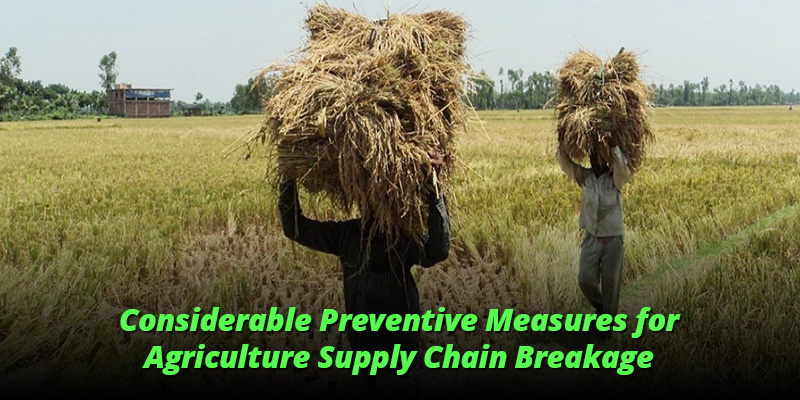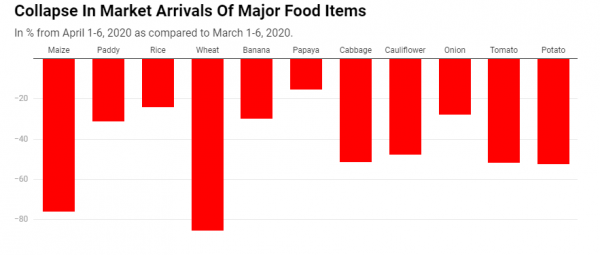The rapid spread of COVID-19 is the biggest concern these days. Since WHO had announced the virus as a global pandemic, many of the countries, including India, have taken multiple actions to fight against it to save living beings. Apart from being a big threat to public health, the effects of coronavirus are escalating difficulties for industrial and business sectors. Considering this, local governments and farmers are also concerned about the growing issues in the agriculture sector.
The Indian governments have been doing a lot to prevent the disruption in the agriculture supply chain, but the unwanted and unexpected weather changes and other factors are coming up as huge barriers to their objectives. And at worst, the agriculture system, on the ground, has been fractured.
According to the data by Agmarknet, collected and used by BloombergQuint shows;
- A decline of 15% in arrivals between March 1 to 6.
- A massive drop of 76% in arrivals, over a period of just one month, between April 1 to 6.
Major Food Items that are unable to reach markets.
According to the statements (published in an article on BloombergQuint) of Abhijit Sen, a former member of the Planning Commission, “Farmers live far away from mandis (markets) and even when they do get to the mandis, their commodities are often not bought or they are paid lower prices.”
He also stated, “This is because the supply chain is choked at two levels. It’s not only difficult for farmers to reach mandis but also for supplies from mandis to reach towns and cities. For instance, movements of trucks which carry agricultural commodities, is at one-fourth the normal level. This is a bigger problem.”
As farmers, suppliers, and consumers are concerned about the supply chain breakage; the government could take the following actions to save farms and farmers and get the supply chain back on track.
Top measures that could help prevent the agriculture supply chain from breaking:
1. No more harassment and violence by people in power
Even in this crucial time, local police is stopping sellers from selling farming essentials such as seeds, fertilisers, etc. The government should issue strict notice immediately to stop the police from doing all this harassment and violence, especially in villages.
2. Agricultural helpline number to the COVID-19 resource centre
There’s an utter need to convert the currently available number – 1800 180 1551 of the Kisan call centre into one that can provide information on COVID-19, its effects on farming, what government is doing to help farmers, and the status of markets in this time, etc. Besides, state agriculture university members and scientists from the ICAR should be easily accessible through this helpline.
3. Utilization of trains
Since travel is temporarily restricted throughout the country, vacant trains can be used to transport farm inputs from suppliers to farmers, and fresh produce from farmers to different states. AC passenger coaches can be dully used to transport perishables. Doing this can get railways good revenue even amid the lockdown. Railways’ recognized freight agents can be appointed to involve them for smooth transport operations. If this can be done, railways should consider some concession to small and medium-size seed sellers and farm input companies.
4. Decentralised procurement
During this lockdown, the government should ensure smooth supply chains and farmers’ produce reach markets. This requires decentralization of village-level farmgate sales of different commodities. Also, PDS items should be picked up and taken to markets by government agencies from the villages where farmgate procurement is not followed anymore.
Sub-market yard system that Punjab has commonly been using during procurement season can help a lot in these tough days. Panchayat compounds, mills, warehouses, etc., can be utilized temporarily as sub-market yards. And PACS can get involved in all this to ensure farmers get a fair price for their commodities.
5. Opening of mandis with proper protection
In order to prevent food supply chains from disruption, regulated market yards and mandis should continuously run, even though at a small scale. And as much as health and safety are concerned, proper isolation can be achieved by giving time slots or tokens to allow farmers to sell their produce at different times.
The current times are very challenging for farmers, and significant support can be given to them by reopening mandis while following proper safety guidelines provided by the governments.
6. Rejuvenation of agri-allied sector
The agri-input market is not functioning presently; thus, the government should allow all manufacturing units and trades that play a significant role in the agriculture sector to start operating again. For instance, the seed industry typically requires packaging units; therefore, packaging businesses should be allowed to function in a controlled manner. Special protection of workers should be taken care of, and the employers should follow all safety regulations.
7. Utilization of digital portals
If possible, the government should allow all mandis and markets to be reopened, even with minimum staff. Also, encourage farmers and suppliers to make efficient use of E-nam (online trading platform) as it can bring a lot of support and opportunities to all – farmers, traders, and buyers in these crucial times.
8. Grain storage solutions
Though there’s no lack of grains and other food raw materials in the government reserves, still farmers need to sell what they are producing to make a living. If there’s a problem with storage facilities, school premises and other buildings in and around villages can be used to store grains and produce safely when required.
9. Stimulus packages
It is highly required to roll out a stimulus package to the seed industry, primarily to small and medium-sized companies. For instance, loans at zero interest rate or low-interest loans can be incorporated in seed stimulus packages.
Conclusion
Although the root cause of these supply chain disruptions in the agriculture sector is the spread of COVID-19, which is getting uncontrollable at the moment, an effective plan prepared by the collaborated efforts of governments and agencies and its implementation at all levels can prevent such disruptions. This will not only streamline the supply chain to help consumers buy essential food items, but also feed the farmers that have been feeding this giant nation for centuries.
Regardless of your location, as a farmer or being associated with farming, you might also be dealing with a lot of difficulties and market uncertainties. For most of your problems and queries related to farms, agriculture, and the market, Apni Kheti has appropriate solutions. In this bad phase, you are not alone; we stand by you.
For more information about Agriculture and Livestock, download Apni Kheti app – Android, iPhone






